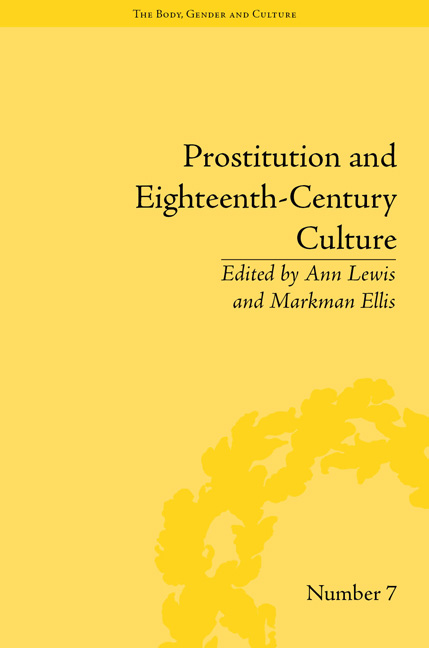Book contents
- Frontmatter
- CONTENTS
- Acknowledgements
- List of Contributors
- List of Figures and Tables
- Introduction: Venal Bodies – Prostitutes and Eighteenth-Century Culture
- Part I (Auto)Biographical and Classificatory Fictions: Madams, Courtesans, Whores
- 1 Classifying the Prostitute in Eighteenth-Century France
- 2 In Her Own Words: An Eighteenth-Century Madam Tells Her Story
- 3 ‘All the World Knows Her Storie’: Aphra Behn and the Duchess of Mazarin
- 4 Marie Petit's Persian Adventure (1705–8): The Eastward Travels of a French ‘Concubine’
- 5 ‘A First-Rate Whore’: Prostitution and Empowerment in the Early Eighteenth Century
- Part II Visibility and Theatricality: Fiction, Image and Performance
- Part III The Magdalen House: Marriage, Motherhood, Social Reintegration
- Part IV Wider Perspectives: Constructing the Prostitute in Social History
- Notes
- Index
2 - In Her Own Words: An Eighteenth-Century Madam Tells Her Story
from Part I - (Auto)Biographical and Classificatory Fictions: Madams, Courtesans, Whores
- Frontmatter
- CONTENTS
- Acknowledgements
- List of Contributors
- List of Figures and Tables
- Introduction: Venal Bodies – Prostitutes and Eighteenth-Century Culture
- Part I (Auto)Biographical and Classificatory Fictions: Madams, Courtesans, Whores
- 1 Classifying the Prostitute in Eighteenth-Century France
- 2 In Her Own Words: An Eighteenth-Century Madam Tells Her Story
- 3 ‘All the World Knows Her Storie’: Aphra Behn and the Duchess of Mazarin
- 4 Marie Petit's Persian Adventure (1705–8): The Eastward Travels of a French ‘Concubine’
- 5 ‘A First-Rate Whore’: Prostitution and Empowerment in the Early Eighteenth Century
- Part II Visibility and Theatricality: Fiction, Image and Performance
- Part III The Magdalen House: Marriage, Motherhood, Social Reintegration
- Part IV Wider Perspectives: Constructing the Prostitute in Social History
- Notes
- Index
Summary
Marie-Madeline Dossement, who lived in Paris from approximately 1748 to 1763, is the subject of this study. Dossement was without accomplishments or distinction, completely obscure during her own lifetime and generally ignored thereafter. She would have remained forgotten and unknown had she not embarked in about 1750 on an unusual career, that of police informer. Every fortnight, she submitted what she called her feuille (paper) or écrit (writing) to Paris police chief, René Berryer de Ravenoville or, more accurately, to his clerks, who then had it copied onto sheets of white paper loosely bound with blue ribbon. In these pages, now preserved in the Archives de la Bastille at the Arsenal library in Paris, Dossement detailed daily life in her brothel, for she was a ‘madame’ or brothel mistress.
Despite her intriguing profession, Dossement and her text have not attracted the attention of many historians, professional or amateur. Only Gaston Capon, a belle époque bibliophile and connoisseur of dirty books, took an interest in her and included a selection from her ‘notebook’ in his two volume study, Les Maisons closes au XVIIIe siècle, published in 1903. Capon analysed only the first forty-one pages of the journal, stopping in July 1751 because ‘this suffices to convey the tone of the institution’. The reports are repetitive, with their long lists of clients that Capon has meticulously footnoted.
- Type
- Chapter
- Information
- Prostitution and Eighteenth-Century CultureSex, Commerce and Morality, pp. 33 - 44Publisher: Pickering & ChattoFirst published in: 2014



